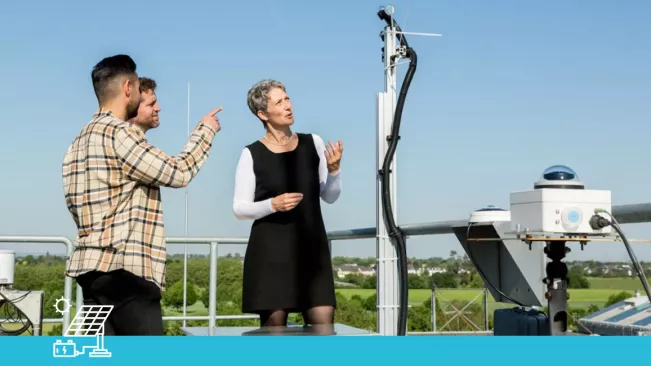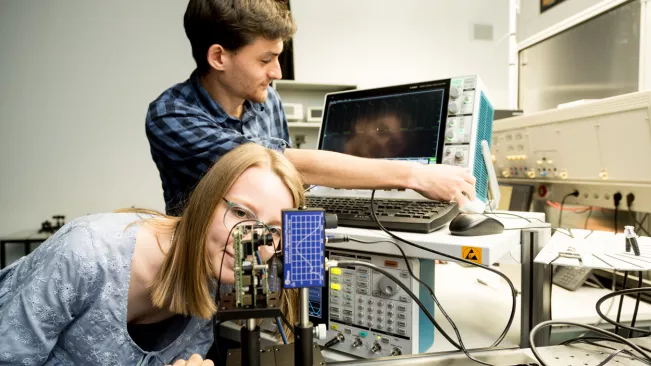International Centre for Sustainable Development (IZNE)
Expansion of the IZNE Board: Professor Marco Jung is a new member

In April 2025, Marco Jung joined the International Centre for Sustainable Development (IZNE) with his research focus on power electronics as the sixth member of the Board of Directors and will add his expertise to the research area Sustainable Technologies and Resource Usage.
What experiences, goals and wishes does Marco Jung bring to the IZNE?
We spoke to him:
IZNE: Welcome Professor Marco Jung and congratulations on your new position as a member of the IZNE Board of Directors. We are delighted that you are part of the team!
Marco Jung: Thank you very much. I am also delighted to be a part of the IZNE.
IZNE: How would you describe your research area in a nutshell?
Jung: In addition to the use of silicon carbide or gallium nitride semiconductors, our work focuses on network-forming control methods. Power Hardware in the Loop methods and digital twins are used for validation at device and system level.
In simple terms, this means: New semiconductor technologies ensure increased efficiency and material savings in power converters, for example in photovoltaic inverters. Renewable energies and all consumers require the grid voltage and frequency. If conventional power plants are reduced or partially eliminated, new components are needed to take over their grid-forming properties (provision of grid voltage and frequency). Current systems are not yet able to do this. To this end, power converters and power grid components are being digitalised in order to verify and optimise the development of control processes.
IZNE: How did you arrive at your current focus on power electronics and what has shaped you most in your professional career?
Jung: Through my first degree at the Technische Hochschule Mittelhessen. The Power Electronics course appealed to me there. During my studies abroad at the TU Havana in Cuba, I applied for a thesis at SMA Solar Technology. There I was able to work on the development of a fuel cell inverter. After completing my studies, I wanted to develop my skills further and enrolled on the Energy Technology degree programme at the University of Kassel. At the same time, I continued to work as a student trainee at SMA and helped develop the Sunny Island. I had been thinking about doing a doctorate for some time, so I applied for a research assistant position at Fraunhofer IEE (then Fraunhofer IWES Kassel). The focus there was always on the energy transition and therefore power electronics for renewable energies, electric vehicles and battery storage systems and their integration into the grid. Looking back, I can say that my time in Cuba and my career path at Fraunhofer had a strong influence on me, as did my current challenge: setting up the Power Electronics and Power Systems Laboratory (PEPS-Lab). There are now 18 scientists working on a wide range of topics.
I am currently working on a number of different topics
„Looking back, I can say that my stay in Cuba and my career path at Fraunhofer had a strong influence on me, as did my current challenge: setting up the Power Electronics and Power Systems Laboratory (PEPS-Lab).”
IZNE: How did you come to join the IZNE Board and what do you hope to gain from your new position?
Jung: A nice conversation with Stefanie Meilinger on the journey home led to various ideas and also highlighted synergies between our research activities. I think together we can continue to advance the topic of sustainable energy systems technology, not only nationally but also internationally.
IZNE: What challenges do you see in your subject area and how would you like to address them, particularly with a view to sustainability?
Jung: The transformation of the energy supply. Our contribution are technologies for the success of the energy transition: Power electronics couples all forms of renewable energy, electric vehicles, battery storage systems, electrolysers, etc. with the power grid. And can simultaneously ensure stability.
„Our contribution are technologies for the success of the energy transition: Power electronics couples all forms of renewable energy, electric vehicles, battery storage systems, electrolysers, etc. with the power grid.”
IZNE: What goals have you set yourself for your work at IZNE? Are there any specific projects that you are already working on?
Jung: In IZNE, I would like to address sustainable energy system technology. In other words, the interaction in the energy system, especially in the power grid. This extends to the charging park level, but also to the interconnected and stand-alone grid level. Here I have a view from the device and system technology, as I know what is possible with power converters. Projects such as Grid Cloud: Optimisation of grid management through the use of digital twins, data analysis and artificial intelligence or F-HIL Reloaded Development of a testing infrastructure for the normative validation of dynamic processes of grid-forming decentralised generation plants are examples of this. I am looking forward to the new project PVCharge, in which we are researching multifunctional power electronics for PV parking spaces: This will result in real PV charging with grid-supporting functions through optimised power converters and intelligent control.
IZNE: What does "sustainability" mean to you? And what drives you to champion the issue?
Jung: In my view, renewable energies are the elementary basis for a more sustainable future. Climate-friendly electricity makes so many other areas easier to implement in terms of sustainability. That's why I enjoy working on the topic of power electronics so much and why I'm under so much pressure.
IZNE: What do you do when you're not researching, teaching or writing requests?
Young: Spending time with my family and friends. Village and club life is important to me. I'm involved on the board of FC Steinbach and FC Dorndorf and also like to slip into one role or another during carnival. Unfortunately, I no longer have time to play the trumpet. Of course you take your passion with you into your private life. I'm involved in various scientific organisations, be it the VDE ETG or the IEEE, on a voluntary basis.
IZNE: Do you have any wishes for the future? What projects do you dream of?
Jung: That the topic of sustainable energy systems technology with all its facets becomes established in research and teaching at H-BRS and brings together the most diverse players within the university. In addition, the equalisation of HAWs with universities in terms of equipment and funding of research activities. I would like to receive an ERC grant one day.
„In my view, renewable energies are the elementary basis for a more sustainable future. Climate-friendly electricity makes it easier to implement sustainability in so many other areas. That's why I enjoy working on the topic of power electronics so much and why I'm working so hard on it.”
Thank you very much for this exciting interview! We wish you a good start and much success as a new member of the IZNE Board of Directors and are looking forward to the topics and food for thought that you will contribute.
Contact us

Marco Jung
Professorship for Electromobility and Electrical Infrastructure with a focus on Power Electronics
Research fields
Location
Sankt Augustin
Room
B213
Address
Grantham-Allee 20
53757 Sankt Augustin
Telephone
+ 49 2241 865 316Location
Sankt Augustin
Room
B213
Address
Grantham-Allee 20
53757 Sankt Augustin
Telephone
+ 49 2241 865 316
Location
Sankt Augustin
Room
F 322
Address
Grantham-Allee 20
53757, Sankt Augustin
Telephone
+49 2241 865 9855Contact points
Kontakt: Internationales Zentrum für Nachhaltige Entwicklung (IZNE)
Campus
Sankt Augustin



